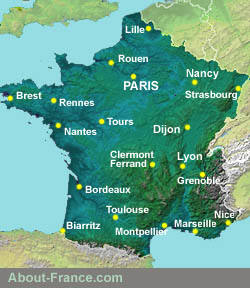
About-France.com
The connoisseur's
guide to France
French life, institutions, society, travel and tourism.

- Explore France ►
- KEY PAGES
- Where to go
- How to get there
- Learn about France
French
grammar
Relative clauses in French
1. Relative pronouns
In
English
the relative pronoun (who,
which etc) can vary according to whether it refers to a
person or an inanimate object. This is not usually the case in French.
In French, the relative pronoun varies according to its grammatical function in the relative clause - as subject, object, possessor or agent in the relative clause.
French has one set of simple relative pronouns, and one fuller set of more specific pronouns.
The simple relative pronouns are used whenever possible.
You can remember these with the mnemonic "kick a donkey" (qui que dont
qui).
The more specific relative pronouns are used when it is necessary to refer back to one out of several potential antecedents in order to avoid ambiguity: they are also generally used in relative clauses with an inanimate antecedent, introduced by a preposition.
► Relative pronouns after prepositions.
With human antecedents , the preposition is normally followed by the simple relative pronoun qui
With inanimate (non-human) anticedents the preposition is normally followed by one of the more specific relative pronouns lequel, laquelle etc.
Normally
a relative clause must directly follow its antecedent, i.e. the word or
group of words which it qualifies. When this is the case, it is
customary to use a simple relative pronoun, in function of the syntax
of the sentence.
In French, the relative pronoun varies according to its grammatical function in the relative clause - as subject, object, possessor or agent in the relative clause.
French has one set of simple relative pronouns, and one fuller set of more specific pronouns.
The simple relative pronouns are used whenever possible.
| Subject | Object | Possessor | After common prepositions | |
| qui | que | dont | qui (quoi) |
The more specific relative pronouns are used when it is necessary to refer back to one out of several potential antecedents in order to avoid ambiguity: they are also generally used in relative clauses with an inanimate antecedent, introduced by a preposition.
| Subject/object | Posessor | with à | After prepositions | |
| m.sing |
lequel | duquel | auquel | prep + lequel |
| f.sing |
laquelle | de laquelle | à laquelle | prep + laquelle |
| m.pl |
lesquels | desquels | auxquels | prep + lesquels |
| f.pl |
lesquelles | desquelles | auxquelles | prep + lesquelles |
► Relative pronouns after prepositions.
With human antecedents , the preposition is normally followed by the simple relative pronoun qui
With inanimate (non-human) anticedents the preposition is normally followed by one of the more specific relative pronouns lequel, laquelle etc.
2. Relative clauses - propositions relatives
Examples
with simple relative
pronouns:
►Subject and object:
I live in a flat which is rather noisy.
J'habite dans un appartement qui est assez bruyant.
I know the lady who wrote that book:
Je connais la dame qui a écrit ce livre.
Here's the money that I owe you:
Voici l'argent que je vous dois.
The guy that you're looking at is my brother:
Le type que vous regardez est mon frère.
The museum that we visited yesterday was very interesting
Le musée que nous avons visité hier était très intéressant.
►Possession
(This includes real possession and other cases when English would use "of whom / of which").
The man whose car was stolen is very angry.
L'homme dont la voiture a été volée est très en colère..
The book, whose title I forget, was very well-known in its time.
Le livre, dont j'oublie le titre, a été très bien connu en son temps.
There are three people over there, two of whom I recognise.
Il y a trois personnes là-bas, dont je reconnais deux.
I have two suggestions, the first of which is this.
J'ai deux propositions, dont voici la première..
►Relative clauses introduced by prepositions.
The man to whom you were talking is my father.
L'homme à qui vous parliez est mon père..
I don't know what you're thinking of.
Je ne sais pas à quoi vous pensez.
He told me the name of the person he was working for.
Il m'a dit le nom de la personne pour qui il travaillait
This is Pierre, a consultant without whom we'd be completely lost.
Voici Pierre, un consultant sans qui nous serions complètement perdus.
►Subject and object:
I live in a flat which is rather noisy.
J'habite dans un appartement qui est assez bruyant.
I know the lady who wrote that book:
Je connais la dame qui a écrit ce livre.
Here's the money that I owe you:
Voici l'argent que je vous dois.
The guy that you're looking at is my brother:
Le type que vous regardez est mon frère.
The museum that we visited yesterday was very interesting
Le musée que nous avons visité hier était très intéressant.
►Possession
(This includes real possession and other cases when English would use "of whom / of which").
The man whose car was stolen is very angry.
L'homme dont la voiture a été volée est très en colère..
The book, whose title I forget, was very well-known in its time.
Le livre, dont j'oublie le titre, a été très bien connu en son temps.
There are three people over there, two of whom I recognise.
Il y a trois personnes là-bas, dont je reconnais deux.
I have two suggestions, the first of which is this.
J'ai deux propositions, dont voici la première..
►Relative clauses introduced by prepositions.
The man to whom you were talking is my father.
L'homme à qui vous parliez est mon père..
I don't know what you're thinking of.
Je ne sais pas à quoi vous pensez.
He told me the name of the person he was working for.
Il m'a dit le nom de la personne pour qui il travaillait
This is Pierre, a consultant without whom we'd be completely lost.
Voici Pierre, un consultant sans qui nous serions complètement perdus.
Relative
clauses introduced by prepositions
As illustrated above, when a relative clauses with a human antecedent is introduced by a preposition, it is customary to use the simple relative pronoun qui .
It is also sometimes possible to use the short form - in this case quoi , when the relative clause has an inanimate antecedent; but this is not very common.
Normally when a relative clause is introduced by a preposition, and refers to an inanimate (non-human) antecedent, it is normal to use one of the more specific relative pronouns lequel, laquelle, lesquels or lesquelles, or one of their derived forms.
As illustrated above, when a relative clauses with a human antecedent is introduced by a preposition, it is customary to use the simple relative pronoun qui .
It is also sometimes possible to use the short form - in this case quoi , when the relative clause has an inanimate antecedent; but this is not very common.
Normally when a relative clause is introduced by a preposition, and refers to an inanimate (non-human) antecedent, it is normal to use one of the more specific relative pronouns lequel, laquelle, lesquels or lesquelles, or one of their derived forms.
Examples:
►Relative clauses introduced by prepositions, and inanimate antecedents
The box in which I was putting them has disappeared.
La boîte dans laquelle je les mettais a disparu..
Where's the bridge we parked the car under ?
Où est le pont sous lequel nous avons garé la voiture?.
He told me the name of the company he was working for.
Il m'a dit le nom de la société pour laquelle il travaillait
These are tools without which we'd be completely lost.
Voici des outils sans lesquels nous serions complètement perdus
Those are precisely the pictures I was referring to.
Ce sont précisément les images auxquelles je me référais.
►Relative clauses introduced by prepositions, and inanimate antecedents
The box in which I was putting them has disappeared.
La boîte dans laquelle je les mettais a disparu..
Where's the bridge we parked the car under ?
Où est le pont sous lequel nous avons garé la voiture?.
He told me the name of the company he was working for.
Il m'a dit le nom de la société pour laquelle il travaillait
These are tools without which we'd be completely lost.
Voici des outils sans lesquels nous serions complètement perdus
Those are precisely the pictures I was referring to.
Ce sont précisément les images auxquelles je me référais.
3. Avoiding ambiguity
Ambiguity can
be caused when a relative clause has more than one potential
antecedent: take this example in English:
This is a photo of the son of my brother, who is fifteen years old.
In this example, is it the son who is 15 or the brother? In strict grammatical terms, it must be the brother - the direct antecedent of who - but logic suggests that it is more likely to be the son.
In French, this sort of ambiguity can often (though not always) be avoided by using one of the more specific relative pronouns lequel, laquelle, lesquels or lesquelles, or one of their derived forms, which must agree in gender and number with its antecedent.
Thus unless two potential antecedents have the same gender and number (as in the example above, where brother and son are both masculine singular), using a gramatically specific relative pronoun can avoid ambiguity.
This is a photo of the son of my brother, who is fifteen years old.
In this example, is it the son who is 15 or the brother? In strict grammatical terms, it must be the brother - the direct antecedent of who - but logic suggests that it is more likely to be the son.
In French, this sort of ambiguity can often (though not always) be avoided by using one of the more specific relative pronouns lequel, laquelle, lesquels or lesquelles, or one of their derived forms, which must agree in gender and number with its antecedent.
Thus unless two potential antecedents have the same gender and number (as in the example above, where brother and son are both masculine singular), using a gramatically specific relative pronoun can avoid ambiguity.
Examples:
►Avoiding ambiguity
This is the daughter of my brother, whom I was talking to you about (ambiguous).
Voici la fille de mon frère, dont je vous parlais. (ambiguous).
Voici la fille de mon frère, de laquelle je vous parlais. (unambiguous).
In the second version above, laquelle can only refer to fille, not frère
There's a lock on each drawer, which is difficult to open (ambiguous).
Il y a une serrure sur chaque tiroir, qui est difficile à ouvrir (ambiguous).
Il y a une serrure sur chaque tiroir, laquelle est difficile à ouvrir (unambiguous).
In the second version above, laquelle can only refer to serrure, (n.f.) not tiroir (n.m.)
►Avoiding ambiguity
This is the daughter of my brother, whom I was talking to you about (ambiguous).
Voici la fille de mon frère, dont je vous parlais. (ambiguous).
Voici la fille de mon frère, de laquelle je vous parlais. (unambiguous).
In the second version above, laquelle can only refer to fille, not frère
There's a lock on each drawer, which is difficult to open (ambiguous).
Il y a une serrure sur chaque tiroir, qui est difficile à ouvrir (ambiguous).
Il y a une serrure sur chaque tiroir, laquelle est difficile à ouvrir (unambiguous).
In the second version above, laquelle can only refer to serrure, (n.f.) not tiroir (n.m.)
| Return to French grammar pages : index | Study or learn French in France | Essential French words and phrases for travellers |
Printer-ready
page
- print or PDF


The Petit train jaune in the Pyrenees


A choice of French
stores & brands that deliver abroad
| ►► French civilisation and culture |
| The regions of France |
| Maps of France |
| France facts and figures |
| The French political system |
| The French economy |
| The French legal system |
| Education in France |
| Health care in France |
| Religion in France |
| The press in France |
| French art |
| A-Z Dictionary of France |
| ►► Site guide |
| About-France.com home |
| Full site index |
| About-France.com site search |
| ►► Principal chapters on About-France.com : |
| The
regions of France Beyond
Paris, a guide to the French regions and their tourist attractions.
|
| Guide
to Paris Make
the most of your trip to Paris; Information on attractions,
Paris hotels,
transport, and lots more.
|
| Tourism
in France
The
main tourist
attractions and places to visit in France - historic
monuments, art galleries, seasides, and more
|
| Planning
a trip to
France
Information
on things to do before starting your trip to France..
|
| Driving
in France
Tips
and useful information on driving in and through France - motorways,
tolls, where to stay....
|
| Maps
of France
Cities,
towns, departments, regions, climate, wine areas and other themes.
|
| The
French way of
life
A
mine of information about life and living in France, including working
in France, living in France, food and eating, education, shopping.
|
| A-Z dictionary of France Encyclopedic
dictionary of modern France - key figures, institutions, acronyms,
culture, icons, etc.
|
Studying the
grammar of a
foreign language is harder for those who are unfamiliar with
the grammar of their own
language... Check out the new acclaimed Descriptive Grammar of English,
a clear compact English grammar available
from Amazon, Waterstones, Barnes & Noble and other good
bookshops.
Copyright
© About-France.com
